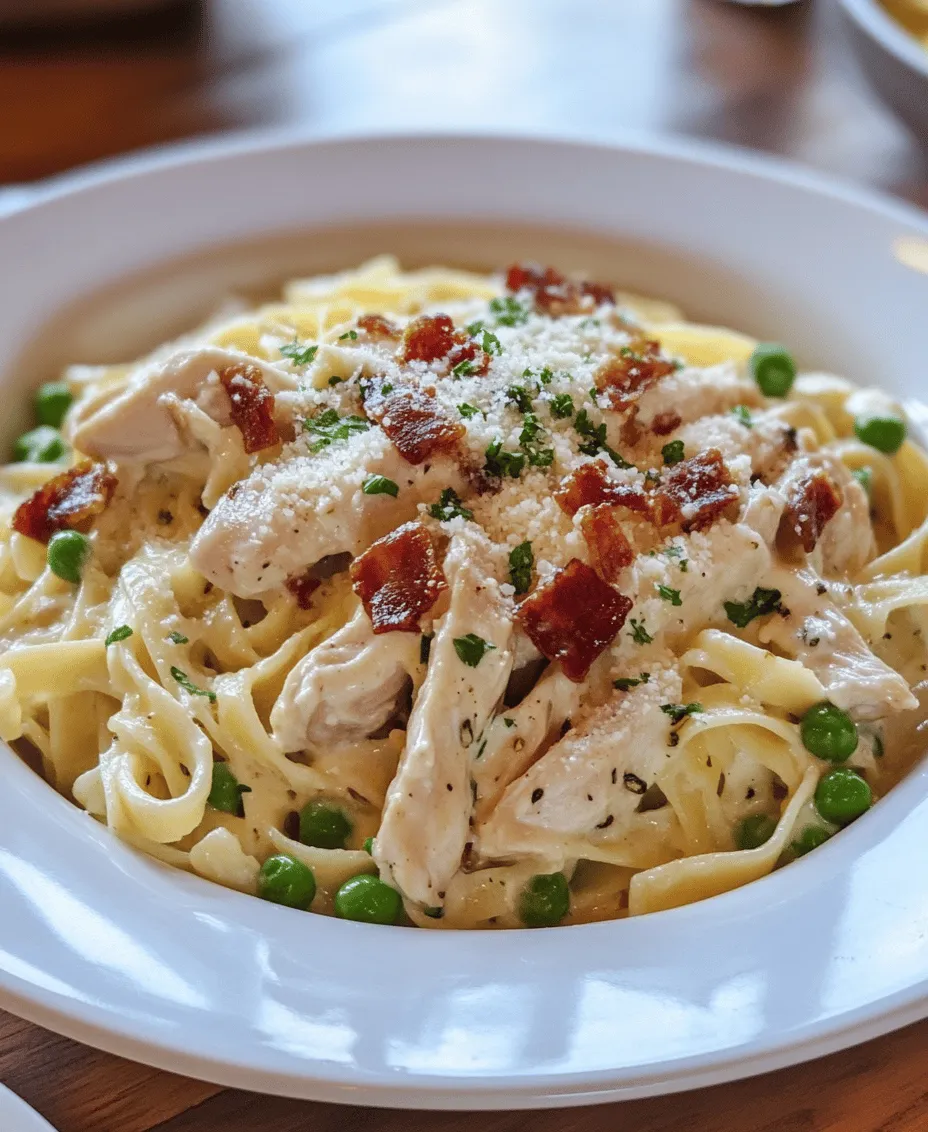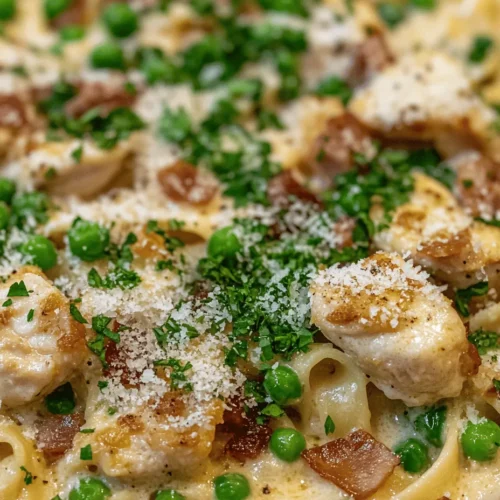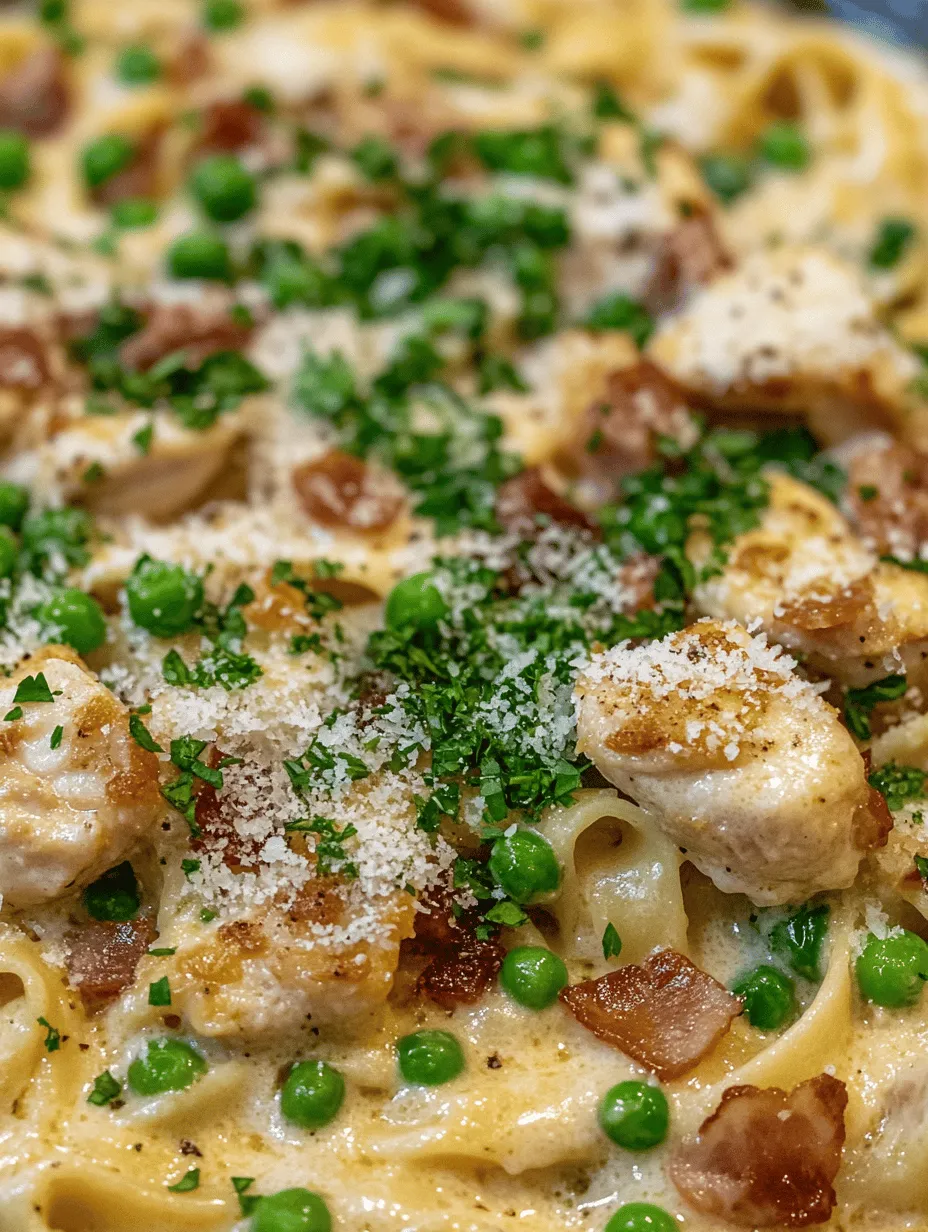Introduction
Chicken Carbonara is a beloved Italian dish that has captured the hearts and taste buds of food lovers around the world. This creamy pasta dish is synonymous with comfort food, offering a delightful combination of rich flavors and satisfying textures. With its roots deeply embedded in Italian culinary tradition, Chicken Carbonara stands out as a family favorite, perfect for weeknight dinners or special gatherings alike. This dish is not only quick to prepare but also provides a hearty meal that brings everyone to the table.
What makes Chicken Carbonara so appealing is its luscious sauce made from eggs, cheese, and a hint of pancetta or bacon, all enveloping tender pasta. This dish invites you to indulge in its creamy goodness while savoring the balance of flavor from the ingredients. Whether you’re a seasoned cook or a kitchen novice, this recipe is designed to impress and satisfy, making it an excellent choice for any occasion.
Understanding Carbonara: A Culinary Tradition
The origins of Carbonara can be traced back to central Italy, specifically the region of Lazio and the city of Rome. Traditionally, Carbonara is made using just a few key ingredients: pasta, eggs, cheese, cured pork (like guanciale or pancetta), and black pepper. The name “Carbonara” is believed to derive from “carbone,” which means “coal” in Italian, suggesting that it was a dish favored by charcoal workers. The simplicity and heartiness of the dish made it a staple for those in need of a filling meal after a hard day’s work.
Over the years, Carbonara has undergone various adaptations, with cooks adding their own twists to the classic recipe. While the original version remains popular, many variations have emerged, incorporating ingredients such as vegetables, different types of pasta, or even cream. These adaptations often reflect personal tastes or regional preferences, showcasing the versatility of this beloved dish.
Among the many variations, Chicken Carbonara has emerged as a popular twist that elevates the classic recipe. By incorporating tender pieces of chicken, this version not only enhances the dish’s flavor but also adds protein, making it even more satisfying. This adaptation provides a delightful opportunity to enjoy the creamy richness of Carbonara while still embracing the essence of traditional Italian cooking.
Ingredients Breakdown
To create the best-ever Chicken Carbonara, it’s essential to understand the key ingredients and their roles in the dish. Using high-quality components will significantly enhance the overall flavor and texture, ensuring that every bite is nothing short of heavenly.
Pasta Selection: Fettuccine vs. Spaghetti
When it comes to choosing the right pasta for Carbonara, both fettuccine and spaghetti can work wonderfully. Spaghetti is the traditional choice, known for its long, thin strands that capture the creamy sauce beautifully. However, fettuccine, with its broader, flat shape, provides a delightful chew and can hold onto the sauce just as effectively. Ultimately, the choice depends on personal preference. Whether you opt for spaghetti or fettuccine, the key is to cook the pasta al dente to achieve the perfect texture.
The Significance of Pecorino Romano Cheese
Pecorino Romano cheese is a staple in authentic Carbonara recipes, contributing a sharp, salty flavor that elevates the dish. Made from sheep’s milk, this cheese adds depth and richness to the sauce, balancing the creaminess of the eggs. While Parmigiano-Reggiano can be used as a substitute, the distinct flavor of Pecorino Romano is what truly embodies the spirit of traditional Carbonara. Be sure to grate it finely to allow it to melt seamlessly into the sauce.
The Role of Pancetta or Bacon
Pancetta, an Italian cured meat, is another vital ingredient that adds depth and richness to Chicken Carbonara. Its savory flavor infuses the dish with a delightful saltiness and complements the creaminess of the sauce. If pancetta is unavailable, you can use good-quality bacon as an alternative. However, opting for pancetta will provide a more authentic flavor profile. Sautéing it until crispy will yield the perfect texture and contribute to the overall harmony of flavors.
Fresh vs. Frozen Peas
Peas are often included in Chicken Carbonara to add a pop of color and a touch of sweetness. Using fresh peas will provide a vibrant flavor and a tender texture that enhances the dish. However, frozen peas can also be a convenient option, retaining their sweetness and nutrition. If using frozen peas, simply add them to the pasta during the last minute of cooking to warm them through without losing their bright green color.
Optional Garnishes
To finish your Chicken Carbonara and elevate its presentation, consider adding a sprinkle of fresh parsley or a dusting of extra grated cheese. Fresh parsley not only adds a burst of color but also a refreshing herbal note that balances the richness of the dish. A generous sprinkle of extra cheese will enhance the flavors while creating a beautiful finish that’s sure to impress your guests.
Preparation Steps for Best-Ever Chicken Carbonara
Now that you’re familiar with the essential ingredients, it’s time to delve into the preparation steps for crafting the best-ever Chicken Carbonara. Follow these detailed instructions to ensure your pasta dish is a resounding success.
Step 1: Preparing the Pasta
1. Boil Water: Begin by bringing a large pot of salted water to a rolling boil. The salt will enhance the flavor of the pasta during cooking.
2. Cook the Pasta: Once the water is boiling, add your choice of pasta (spaghetti or fettuccine) and cook according to the package instructions until al dente. Stir occasionally to prevent the pasta from sticking together.
3. Reserve Pasta Water: Before draining the pasta, reserve about 1 cup of the pasta cooking water. This starchy water will be crucial for achieving the desired sauce consistency later.
4. Drain the Pasta: After the pasta is cooked to perfection, drain it in a colander, but do not rinse it. Rinsing will wash away the starch that helps the sauce adhere to the pasta.
Step 2: Cooking the Chicken
1. Prepare the Chicken: While the pasta is cooking, take 2 boneless, skinless chicken breasts and season them generously with salt and freshly cracked black pepper.
2. Sauté the Chicken: In a large skillet over medium heat, add a tablespoon of olive oil. Once the oil is hot, add the seasoned chicken breasts and sauté for about 6-7 minutes on each side, or until they are golden brown and cooked through. The internal temperature should reach 165°F (75°C).
3. Slice the Chicken: Once cooked, transfer the chicken to a cutting board and let it rest for a few minutes. After resting, slice the chicken into bite-sized pieces.
Step 3: Making the Sauce
1. Cook the Pancetta: In the same skillet used for the chicken, add another tablespoon of olive oil if needed. Add about 4 ounces of diced pancetta or bacon and sauté over medium heat until crispy, about 4-5 minutes. The rendered fat will add flavor to the dish.
2. Prepare the Egg Mixture: In a mixing bowl, whisk together 2 large eggs and 1 cup of finely grated Pecorino Romano cheese until well combined. This mixture will form the creamy sauce when mixed with the hot pasta.
3. Combine Pasta, Chicken, and Pancetta: Once the pancetta is crispy, add the drained pasta and sliced chicken to the skillet. Toss everything together to combine, ensuring that the pasta is coated in the flavorful fat from the pancetta.
4. Create the Sauce: Remove the skillet from the heat and quickly pour the egg and cheese mixture over the pasta, tossing constantly. It’s important to do this off the heat to avoid scrambling the eggs. The residual heat from the pasta will cook the eggs gently, creating a creamy sauce. If needed, add a little reserved pasta water to loosen the sauce and achieve your desired consistency.
By following these initial steps, you are well on your way to creating a delicious Chicken Carbonara that is sure to impress. With its rich flavors and creamy texture, this dish embodies the essence of comfort food while being a perfect option for any meal occasion.

Best-Ever Chicken Carbonara Recipe: Steps, Tips, and Serving Suggestions
Importance of Salt in the Pasta Water and Timing for Al Dente
When making pasta, the first crucial step is salting the water. This step is often overlooked, yet it is essential for enhancing the overall flavor of the dish. You should aim to add approximately 1–2 tablespoons of salt for every 4–6 quarts of water. This might seem like a lot, but remember, you’re only salting the water, and the pasta will absorb just enough to enhance its flavor.
Timing is equally important when cooking pasta. For Chicken Carbonara, you want your pasta to reach the al dente stage, which means it should be firm to the bite. Typically, this is about 1–2 minutes less than the package instructions suggest. Keep an eye on the pasta and start tasting it a minute or so before the suggested cooking time. This way, you can ensure perfect texture that will hold up well when mixed with the sauce.
Sautéing Chicken: Achieving the Ideal Golden Brown Color and Seasoning Tips
Sautéing the chicken properly is a key step in achieving that rich flavor profile characteristic of a great Chicken Carbonara. Start by cutting your chicken breasts into bite-sized pieces and patting them dry with a paper towel. This step is vital because moisture can prevent browning.
Heat a tablespoon of olive oil in a large skillet over medium-high heat. Once the oil shimmers, add the chicken pieces in a single layer, ensuring not to overcrowd the pan. This will allow for even cooking and browning. Season the chicken with a pinch of salt and freshly cracked black pepper.
Cook for about 5–7 minutes, turning occasionally, until the chicken is golden brown and cooked through. This process not only locks in moisture but also creates a beautiful crust that adds depth to the dish. Once done, remove the chicken from the skillet and set it aside, keeping it warm while you prepare the pancetta.
Cooking Pancetta: Techniques for Achieving Perfect Crispiness and Flavor Infusion
Pancetta is a vital ingredient in Chicken Carbonara, imparting a savory richness that complements the chicken beautifully. For the best results, use high-quality pancetta and cut it into small cubes or strips.
In the same skillet where you sautéed the chicken, add the pancetta. If there’s excess fat from the chicken, you can leave it in the pan as it will enhance the flavor. Cook the pancetta over medium heat, stirring frequently, until it becomes crispy and golden brown—about 4–5 minutes. This process not only renders the fat but also allows the pancetta to release its savory flavor into the dish.
Once the pancetta is crispy, you can remove it from the skillet but leave the rendered fat. This will serve as a flavorful base for your Carbonara sauce.
Creating the Carbonara Sauce: The Science Behind Tempering Eggs to Avoid Scrambling
The Carbonara sauce is a simple yet sophisticated blend of eggs, cheese, and pepper. To achieve that creamy texture without scrambling the eggs, you must temper them properly. Start by whisking together 3 large eggs and 1 cup of grated Pecorino Romano cheese in a bowl. Add a generous amount of freshly cracked black pepper for flavor.
The key to preventing scrambled eggs is to gradually mix in hot pasta water. First, reserve about 1 cup of the pasta water before draining the pasta. While the pasta is still steaming, take a ladleful of the hot water and slowly whisk it into the egg and cheese mixture. This step raises the temperature of the eggs without cooking them, resulting in a creamy sauce.
Explanation of the Process of Mixing Egg and Cheese
Once the egg mixture is tempered, it’s time to combine it with the pasta. After draining the pasta, immediately add it back into the skillet with the pancetta and any remaining fat. Remove the skillet from the heat—this is crucial to avoid direct heat that could scramble the eggs.
Pour the tempered egg and cheese mixture over the hot pasta. Using tongs, toss everything together quickly and thoroughly. The heat from the pasta will cook the eggs gently, creating a silky sauce that clings beautifully to each strand.
The Critical Step of Incorporating Reserved Pasta Water to Achieve Creaminess
To achieve the desired creamy consistency, you may need to add some reserved pasta water. Start with a few tablespoons and continue tossing the pasta until the sauce reaches your preferred creaminess. The starch in the pasta water helps to bind everything together, creating a luxurious texture that enhances the overall dish. If you find the sauce too thick, simply add more pasta water, a little at a time, until you reach the perfect consistency.
Combining All Components: Techniques for Ensuring Even Distribution of Sauce and Ingredients
Once the pasta is coated in the Carbonara sauce, it’s time to reintroduce the sautéed chicken. Gently fold the chicken into the pasta, ensuring even distribution. This step is crucial to ensure each bite is packed with flavor and texture.
For an added touch, you can sprinkle more cheese on top and finish with a bit more freshly cracked black pepper. The combination of the creamy sauce, crispy pancetta, tender chicken, and salty cheese creates a multi-layered flavor profile that is simply irresistible.
Serving Suggestions
Ideal Plating Techniques for a Visually Appealing Presentation
Presentation is key when serving Chicken Carbonara. For an elegant touch, use a large, shallow bowl or a plate with a slight edge. Use tongs to twirl a portion of pasta and chicken into a nest-like shape in the center of the plate. Drizzle a bit of extra virgin olive oil over the top, and finish with a sprinkle of chopped parsley or basil for color.
Suggested Pairings: Wine and Side Dishes that Complement Chicken Carbonara
Pair your Chicken Carbonara with a light white wine, such as Pinot Grigio or Chardonnay. The acidity in the wine will cut through the richness of the dish, providing a well-rounded dining experience.
For side dishes, consider a simple arugula salad dressed with lemon vinaigrette or roasted vegetables. These options add freshness and balance to the meal without overshadowing the rich flavors of the Carbonara.
Creative Variations: Introducing Vegetables or Alternative Proteins for Customization
While traditional Chicken Carbonara is undeniably delicious, consider adding your twist. You can incorporate vegetables like peas, spinach, or mushrooms for added nutrition and flavor.
If you’re looking to switch up the protein, try substituting grilled shrimp or sautéed mushrooms for a vegetarian version. This flexibility allows you to customize the dish to suit your dietary preferences while still enjoying the essence of Carbonara.
Nutritional Information
Overview of the Nutritional Content Per Serving
A typical serving of Chicken Carbonara contains approximately 600–700 calories, depending on the quantities of ingredients used. This calorie count includes the rich combination of chicken, pasta, cheese, and pancetta.
In addition to calories, you can expect a good source of protein from the chicken and cheese, along with carbohydrates from the pasta. However, it’s essential to consider portion sizes if you’re keeping an eye on your caloric intake.
Discussion on Balancing Indulgence with Health: Modifying Ingredients to Suit Dietary Preferences
While Chicken Carbonara is a comforting indulgence, there are ways to make it lighter without sacrificing flavor. Consider using whole wheat pasta for added fiber or substituting some of the cheese with a lower-fat option. Additionally, using less pancetta or substituting turkey bacon can help reduce the overall fat content of the dish.
Tips for Making a Lighter Version Without Sacrificing Flavor
If you want to lighten your Chicken Carbonara, here are a few tips:
1. Use Olive Oil Instead of Butter: This provides healthy fats while reducing saturated fat content.
2. Choose Lean Proteins: Opt for skinless chicken breast or turkey bacon instead of traditional pancetta.
3. Add More Vegetables: Incorporating vegetables not only boosts nutrition but also adds volume, helping you feel fuller with fewer calories.
4. Lighter Cheese Options: Consider using part-skim ricotta or a reduced-fat cheese to cut calories while still achieving creaminess.
Conclusion
Chicken Carbonara is a delightful dish that showcases the beautiful marriage of flavors and textures. With its rich sauce, tender chicken, and crispy pancetta, it’s a comforting meal that can be prepared in under 30 minutes, making it perfect for busy weeknights or special occasions alike.
We encourage you to try this recipe and experience the comforting flavors that make Chicken Carbonara a beloved classic. Cooking is not just about feeding ourselves; it’s about creating memories and sharing joy with loved ones. So gather your family around the table, serve up this dish, and relish the satisfaction of a homemade Italian meal that’s sure to impress. Enjoy!



